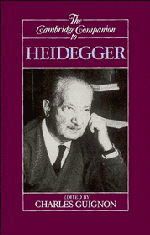Book contents
- Frontmatter
- Introduction
- 1 The question of being
- 2 Reading a life
- 3 The unity of Heidegger's thought
- 4 Intentionality and world
- 5 Time and phenomenology in Husserl and Heidegger
- 6 Heidegger and the hermeneutic turn
- 7 Death, time, history
- 8 Authenticity, moral values, and psychotherapy
- 9 Heidegger, Buddhism, and deep ecology
- 10 Heidegger and theology
- 11 Heidegger on the connection between nihilism, art, technology, and politics
- 12 Engaged agency and background in Heidegger
- 13 Wittgenstein, Heidegger, and the reification of language
- Bibliography
- Index
3 - The unity of Heidegger's thought
Published online by Cambridge University Press: 28 May 2006
- Frontmatter
- Introduction
- 1 The question of being
- 2 Reading a life
- 3 The unity of Heidegger's thought
- 4 Intentionality and world
- 5 Time and phenomenology in Husserl and Heidegger
- 6 Heidegger and the hermeneutic turn
- 7 Death, time, history
- 8 Authenticity, moral values, and psychotherapy
- 9 Heidegger, Buddhism, and deep ecology
- 10 Heidegger and theology
- 11 Heidegger on the connection between nihilism, art, technology, and politics
- 12 Engaged agency and background in Heidegger
- 13 Wittgenstein, Heidegger, and the reification of language
- Bibliography
- Index
Summary
In 1975, just a year before his death, the publication of a complete edition of Heidegger's works began. This edition will eventually comprise not only all of his previously published writings, but also a considerable number of unpublished manuscripts from various periods in his philosophical career and the lecture series that he presented at the universities of Marburg and Freiburg in the twenties, thirties, and forties. Since the first volume of this edition appeared, a considerable number of these lecture series have been published, and they constitute a resource of the first importance for anyone interested in the evolution of Heidegger's thought. This is especially the case for those lecture series that fall into the period in which Heidegger was working out the position he presented in Being and Time (1927), as well as those presented in the years immediately thereafter. In a recent study of Heidegger's thought I draw extensively on these new publications, and it is the main thesis of that study that I present in this essay.
As my title indicates, that thesis has to do with the unity of Heidegger's thought; by this I mean the unity of his thought through the “turning,” or Kehre, that is usually supposed to separate the thought of the later period from that of Being and Time. It has become common practice among interpreters of Heidegger's philosophy to base themselves mainly on the writings that follow this turning, and even to push the divorce of the later from the earlier writings to the point of consigning Being and Time to a suppositious "Cartesian and Kantian" period in Heidegger's philosophical career.
- Type
- Chapter
- Information
- The Cambridge Companion to Heidegger , pp. 97 - 121Publisher: Cambridge University PressPrint publication year: 1993
- 7
- Cited by



